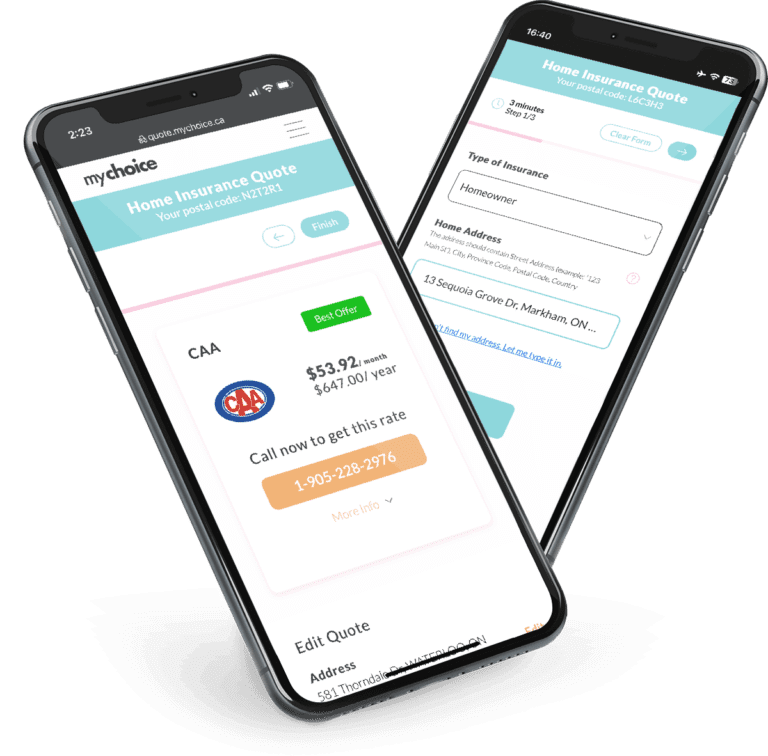As a homeowner in British Columbia, you’ll need to learn to navigate its home insurance landscape. Unfortunately, it can be confusing, thanks to the abundance of insurance options, risk factors, and insurance companies.
Knowing the ins and outs of home insurance in British Columbia helps you find the best policy deals. Discover what types of insurance coverages are available, what to do to save money on insurance, and what risk factors are common to homeowners in the province.
Quote data from MyChoice.ca, March 2025
Common Risk Factors for Homeowners in British Columbia
Different parts of Canada have their own unique risk factors for homeowners. Here are two major risk factors you may encounter when living in British Columbia:
Severe Event Probability in British Columbia
In July 2017, record wildfires burned through BC’s interior, forcing thousands from their homes and straining firefighting resources.
Below are the MyChoice severe event probability scores for British Columbia, based on the historical data from the Canadian Disaster Database collected since 1950. The percentages reflect the likelihood of a major event in question occurring at least once in the region in the next decade – relative to other regions and events.
Does Where You Live in British Columbia Affect Your Home Insurance?
Where you live in British Columbia affects your home insurance, because different areas have different risks. For instance, living in Vancouver Island increases your home’s risk of fire damage, which may raise your likelihood of making insurance claims. A home in Vancouver Island and a comparable home somewhere less fire-prone may have different insurance rates.
Most Expensive Cities to Insure a Home in British Columbia
The average home insurance rate that you pay will vary depending on which city you live in British Columbia, rates can vary greatly based on your surroundings. For the most part, the more expensive locations are in and around Vancouver which shouldn’t come as a surprise to many, the median house price for the area can be up to 9x higher than the rest of the province, which affects home insurance rates.
| City | Average Annual Insurance Premium |
|---|---|
| Vancouver | $1,479 |
| North Vancouver | $1,436 |
| Richmond | $1,433 |
Quote data from MyChoice.ca, March 2025
Housing Data in British Columbia
The 2021 Census of Population has complete information on the housing landscape in British Columbia. Here’s a summary of several key points:
How Does Home Insurance in British Columbia Work?
Home insurance in British Columbia works by compensating you if your home or its contents get damaged by unforeseen events. If the events are covered in your policy, you can file an insurance claim to receive money. Tenant insurance and condo insurance work the same way but for different types of dwellings.
Here are the three types of home insurance coverage available in British Columbia:
FAQs About Home Insurance in British Columbia
How much is home insurance in British Columbia?[2]
The average cost of home insurance in British Columbia is about $1,250 annually depending on the type of dwelling, location, and other factors. Home insurance costs differ between home insurance providers. Note that several considerations can increase or decrease the cost of your British Columbia home insurance, such as your home’s value and the property’s condition.
For a better overview of the cost of home insurance in British Columbia, talk to an insurance broker or look up quotes on MyChoice.
Is home insurance mandatory in British Columbia?
No, home insurance isn’t mandatory in British Columbia. However, if you take out a mortgage on your home, your lender may require you to get coverage as a condition of getting a loan.
It’s also highly recommended that you get home insurance even if it’s not mandatory, so you can protect your house and personal property in case of unforeseen events like fires and hailstorms.
Do I need home construction insurance in British Columbia for my renovation?
Yes, if you’re planning a major home construction or renovation project in British Columbia, home construction insurance will protect you and your home during the process.
Also known as builder’s risk insurance, home construction insurance provides coverage in the event of damage or loss to your home and construction materials during the construction process. Some companies that offer this policy type even have liability coverage in case someone gets injured on your property during construction.
What is the home insurance claims process in British Columbia?
The home insurance claims process in British Columbia varies between insurers, but it generally consists of the following steps:
– Report the claim: Contact your insurer and inform them about the damage or loss, including relevant details and evidence like videos or photos.
– Claim evaluation: Your insurer will assign an adjuster, who will schedule an assessment of the value of any loss or damage.
– Approval or denial: After the home inspection and evaluating your documentation, your insurer will either deny your claim or approve it, offering a settlement for repairs or replacement of damaged property.
– Claim resolution: If you accept the offer, the payment will be made. If not, you can negotiate with your insurer or file a dispute with the Financial Services Regulatory Authority of British Columbia (FSRA).
Can you cancel home insurance in British Columbia?
Yes, you can cancel your home insurance policy in British Columbia. The process may vary depending on your insurer and policy terms.
Generally, you’ll need to contact your insurance provider to let them know. Some insurers may require written notice of cancellation by mail or email.
Keep in mind that if you cancel your policy before its expiry date, you may be subject to penalties or cancellation fees.
Do I need home insurance for Airbnb in British Columbia?
Yes, you may need home insurance for Airbnb in British Columbia. While Airbnb has some host protection insurance, its coverage is limited and may not cover all types of liabilities or damages if you’re using your home for short-term rentals. Having a home insurance policy can provide additional protection and peace of mind.
Note that renting out your property as an Airbnb without telling your insurer may void your policy, and not all home insurance policies include coverage for short-term rentals. Check with your home insurance company to see if your policy has this protection or if you need to get additional coverage.
I have a vacation home in another city in British Columbia. Can I insure that home too even if I don’t always live there?
Yes, you can insure your vacation home in another city in British Columbia even if you don’t always live there. There are insurance policies specially tailored to cover seasonal or vacation homes to protect your property, belongings, and other liabilities from damage or loss.
Typically, these policies offer coverage for damages due to risks like fire, theft, and water damage. They may also have coverage for additional situations such as temporary living expenses if a covered risk makes your vacation home uninhabitable.
Home insurance companies have different requirements and limitations for vacation home insurance. In some cases, you may be required to take out additional coverage or accept different terms and conditions.
Is fire insurance mandatory in British Columbia?
No, fire insurance is not mandatory in British Columbia. However, it’s highly recommended that property owners get it to cover damages or loss to their property caused by fire, smoke, and other related perils.
Note that some British Columbia mortgage lenders may require borrowers to have fire insurance coverage as a loan condition. This is because the property is collateral for the loan, and the mortgage lender may require coverage to protect the property from loss or damage.
Can I bundle home insurance with auto insurance in British Columbia?
Yes, you can bundle home insurance with auto insurance in British Columbia. Insurance companies typically offer bundled packages, and getting one can lead to big cost savings. It can also be more convenient for managing your insurance policies and premium payments, so you should compare bundles between insurers to see what discounts and levels of coverage they offer.
It’s my first time owning a house in British Columbia. What type of home insurance should I get?
Before choosing a home insurance policy, first-time homeowners should consider the following factors:
-Financial capability
– Risk of exposure to specific risks in their area, such as flooding or earthquakes
– Home value and condition
If you’re on a low budget and live in an area that isn’t prone to natural disasters or crime, a basic policy may be enough for your needs. But if you want to cover all your bases, comprehensive home insurance will help you rest easy.
Talk to your insurance provider to find the best option for your budget and the coverage you need.
Who has the best home insurance rates in British Columbia?
There’s no definitive company that offers the “best” home insurance rates in British Columbia. This is because different providers will have their own processes for assessing the cost of providing coverage, so premiums vary from company to company for the same homeowner-applicant.
To find the best British Columbia home insurance rates, compare offers through MyChoice’s home insurance calculator. We can help you find the most affordable options on the market.
Will I be charged if I switch home insurance providers in British Columbia?
Yes, you may be charged if you switch home insurance providers in British Columbia. Depending on the terms of your current policy, your provider may charge a fee for cancelling your policy before its expiration, while others don’t. Review your policy and talk to your provider to prepare for potential penalties.
What companies offer high-risk home insurance in British Columbia?
Most insurance companies in British Columbia offer high-risk home insurance. However, the rates that they’ll present will vary depending on their assessed risk of insuring your property in your area, as well as the factors that make you “high-risk”.
High-risk home insurance can be much more expensive than a standard policy, so compare rates through MyChoice to find affordable coverage for your home.
What is a home insurance peril?
A home insurance peril is a risk or event that may cause damage or loss to your home, covered by your home insurance policy. Examples of perils typically covered by standard home insurance policies in British Columbia are:
– Hail and ice damage
– Fire and smoke
– Damage from lightning strikes
– Theft
– Vandalism
Do I need home insurance before closing in British Columbia?
You need home insurance before closing in British Columbia if your mortgage lender requires it. Lenders require you to get home insurance because they have a stake in your property as well.
What factors aren’t used to calculate British Columbia home insurance rates?
Factors that aren’t used to calculate British Columbia home insurance rates include:
– Disability
– Marital status
– Political affiliation
– Race
– Religion
– Sexual orientation and gender
How is home insurance regulated in British Columbia?
Home insurance in British Columbia is regulated by the British Columbia Financial Services Authority, which oversees and regulates the daily operations of insurers in the province.



















